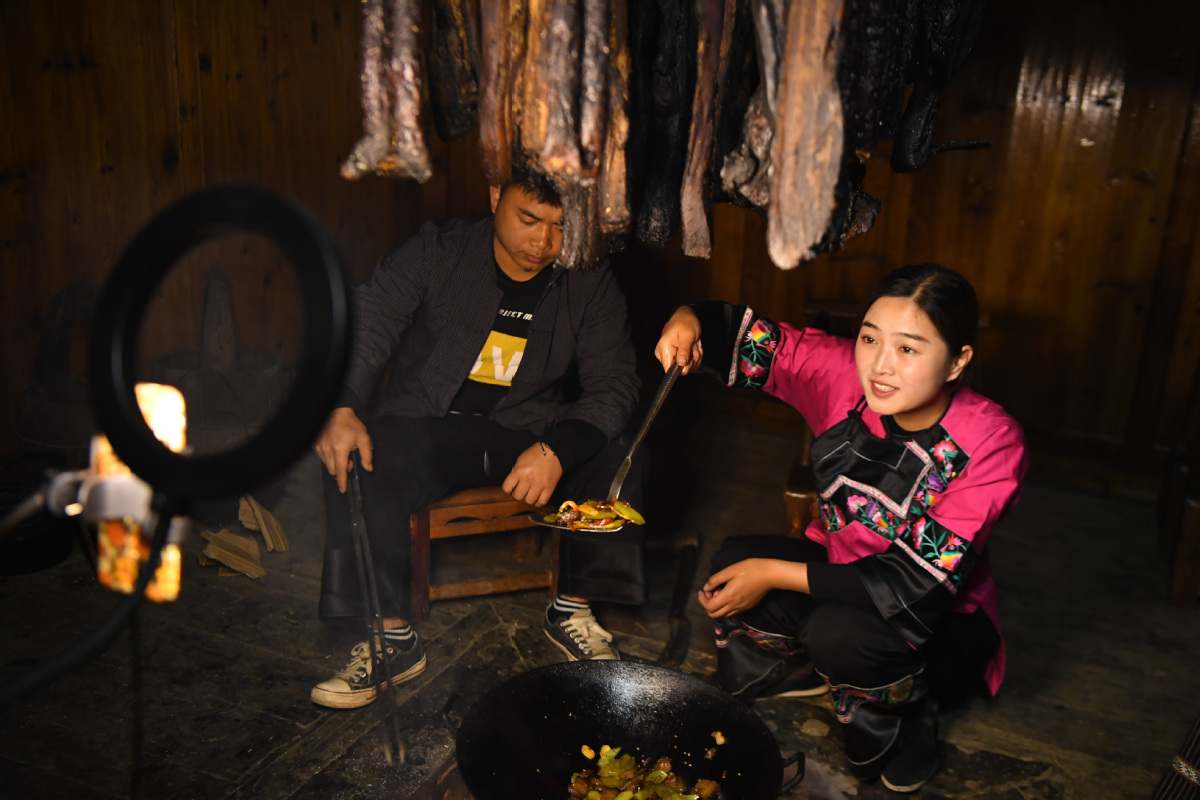Tradition helps overcome poverty
Miao ethnic group taps local resources and digital platforms to showcase its cuisine, dances


Cooperative formed
Under her lead, more than 190 housewives have joined the cooperative for producing handmade Miao embroidery works in the past six years. Each of them can earn about 3,000 yuan during busy months.
The cooperative's Miao embroidery products have received more orders as a result of the growing interest. But Shi still worries about their work.
"There aren't enough orders to keep us busy through the whole year and there is a dearth of talent to provide designs for the embroidery. These are the two major problems," she said.
"We will improve our products, adding items like purses, bookmarks and hats; we will go out to promote them and we are hoping to find designers," Shi said of her plans.
The villagers' efforts to tap local culture for improving lives is in line with "targeted poverty alleviation", a concept first put forward when Xi visited the then poverty-stricken village on an inspection tour in November 2013.
The concept includes precisely identifying impoverished residents and cultivating suitable businesses to help locals eliminate poverty and to thrive, requiring relief measures tailored to different local conditions.
The approach has become a guiding principle in the country's effort to eradicate poverty by the end of this year.
Other than tapping ethnic tradition, Shibadong has also developed other suitable industries based on its scenic beauty and other natural resources, such as rural tourism and agricultural products.
"We have advantages to develop rural tourism, with our special Miao culture, picturesque valleys and rich ecological resources," said the village's deputy director Long Jilong.
The village renovated its infrastructure first, including roads, power grids, residential buildings and tourism facilities.
To fully develop tourism, the village brought in a leading tourism company in 2018 to manage the industry and provide standard services.
Last year, the village received more than 600,000 visitors, twice the number compared with the year before.
"The booming tourism has provided many opportunities for residents to boost their income," Long said.
More than 200 villagers have become involved in the tourism sector, including operating restaurants and guesthouses, working as tour guides, shuttle bus drivers, security guards and cleaners, or selling local specialties to tourists.
New sources of wealth
"Villagers are now enjoying better living conditions and have found new sources of wealth," Long said.
In 2016, Shibadong shed its poverty label, with villagers' per capita income reaching 8,313 yuan, significantly higher than the national poverty line of about 3,000. In 2019, per capita income in the village reached 14,668 yuan, almost nine times the level in 2013.
The transformation has attracted over 200 young people back to Shibadong, which was called a "hollow village" in the past because most young people went out to the big cities to find jobs, leaving their elderly parents and children at home, Long said.
"Developing various suitable industries is key to the village's future," said Sun Zhongyuan, the current Party chief of Shibadong.
Based on local weather and geography, villagers also found kiwi fruit to be a suitable crop.
But limited cultivable land, with one resident owning less than 1 mu (0.067 hectares) on average, had prevented the village from growing kiwi on an industrial level.
In 2014, Shibadong rented 1,000 mu of land from a neighboring village to develop kiwi farming, with villagers able to get a share of the farming profits at the end of a year.
With abundant natural mountain spring water, Shibadong also brought in a water company, which taps the village's land and water resources, sharing its profits with the village.
In 2019, the village received more than 600,000 yuan of profit share from the water company, Sun said.
While some villagers are benefiting from the collective industries, others are continuing to find their own business opportunities.
One of them, 33-year-old Long Xianlan discovered that the village's lush greenery offered the perfect conditions for raising bees.
Starting from 2015, Long gradually grew his beekeeping enterprise. His initial four boxes of bees have grown to more than 300 crates, helping him rake in an annual income of 400,000 yuan last year from just a few thousand yuan before 2015.























